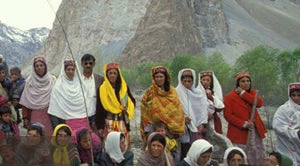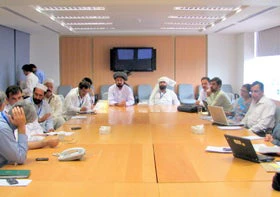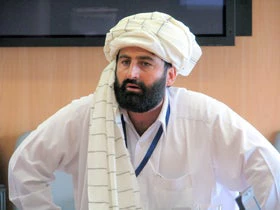 The best part about working in a country office is the wide array of stakeholders one gets to work with. Development is never a solitary, insular process; indeed, it combines the expertise and inputs of a variety of people from diverse backgrounds: the government, civil society, the private sector, multilateral and bilateral financing institutions – the list is long! So you can imagine my excitement when my colleague, Tahira Syed, called me a few days ago to ask me to participate in a series of consultations with government and civil society representatives from the Federally Administered Tribal Areas (FATA) of Pakistan. Tahira is the TTL for a Multi-Donor Trust Fund-financed project which will focus on providing sustainable livelihood opportunities and improvement in local-level infrastructure for FATA residents.
The best part about working in a country office is the wide array of stakeholders one gets to work with. Development is never a solitary, insular process; indeed, it combines the expertise and inputs of a variety of people from diverse backgrounds: the government, civil society, the private sector, multilateral and bilateral financing institutions – the list is long! So you can imagine my excitement when my colleague, Tahira Syed, called me a few days ago to ask me to participate in a series of consultations with government and civil society representatives from the Federally Administered Tribal Areas (FATA) of Pakistan. Tahira is the TTL for a Multi-Donor Trust Fund-financed project which will focus on providing sustainable livelihood opportunities and improvement in local-level infrastructure for FATA residents.
As the project is moving forward in the design and preparation phase, it was an opportune time to hold consultations with the two most important stakeholders of the project: local government and community organizations and representatives. Both groups have very different mandates and roles to play in the development of their areas, but hearing their perspective is crucial and informs the overall outcome of the project.
 The morning of the consultations, Tahira provided some overall context about the MDTF, the rationale behind the project and introduced the broad themes of the project. After that, there was no going back. On day one, the political administration officials had so much to say that we found the three hours scheduled for the consultation to be barely sufficient for their tremendous amount of insight and knowledge of their areas. They told us about how tribes operate in FATA, leadership norms, concepts of justice and equity.
The morning of the consultations, Tahira provided some overall context about the MDTF, the rationale behind the project and introduced the broad themes of the project. After that, there was no going back. On day one, the political administration officials had so much to say that we found the three hours scheduled for the consultation to be barely sufficient for their tremendous amount of insight and knowledge of their areas. They told us about how tribes operate in FATA, leadership norms, concepts of justice and equity.
Day two’s discussions with FATA civil society organizations and community representatives were equally enlightening. And to see the passion with which they participated was also refreshing. One tribal leader (called a “Mallack”) travelled 700 kilometers to attend the meeting! (He and I later had a detailed discussion on his turban, which is an honorary headdress given to only a select few in an entire region). He, and other participants, were unwavering in their criticism of projects which were not adequately monitored. Most of the feedback we received revolved around the need to strengthen civil society organizations, but moreover, to improve agriculture and livestock production. FATA’s economy is largely agrarian, so to ignore agriculture and livestock would be a big mistake.
 On a personal level, two inter-related points will continue to be at the forefront of my thoughts as this project – and the MDTF’s work – progresses. One is that I am constantly humbled by my ignorance. The FATA residents we met and interacted with taught us so much about their customs, traditions and lifestyle that I was left speechless at how mis-informed and ill-informed I was. And this relates to my second point, which is that we need to visit these people in their communities to see how they lead their lives. It is my sincere hope that one day, the security situation improves to the extent that I can sit with them and deliberate on a village dispute, or that I can help them rebuild a small business that was destroyed in the militancy crisis.
On a personal level, two inter-related points will continue to be at the forefront of my thoughts as this project – and the MDTF’s work – progresses. One is that I am constantly humbled by my ignorance. The FATA residents we met and interacted with taught us so much about their customs, traditions and lifestyle that I was left speechless at how mis-informed and ill-informed I was. And this relates to my second point, which is that we need to visit these people in their communities to see how they lead their lives. It is my sincere hope that one day, the security situation improves to the extent that I can sit with them and deliberate on a village dispute, or that I can help them rebuild a small business that was destroyed in the militancy crisis.
Many of my colleagues and friends share these hopes and desires. Indeed, the MDTF was established for just these reasons. And today, Tahira and her team are doing their small part in helping improve lives for the people of FATA. If a tribal leader can travel 700 kilometers to assist us in our project preparation, the least we can do is heed their advice and benefit from their immense knowledge. We’ve taken the first steps and are quite excited about the journey which will follow.





Join the Conversation